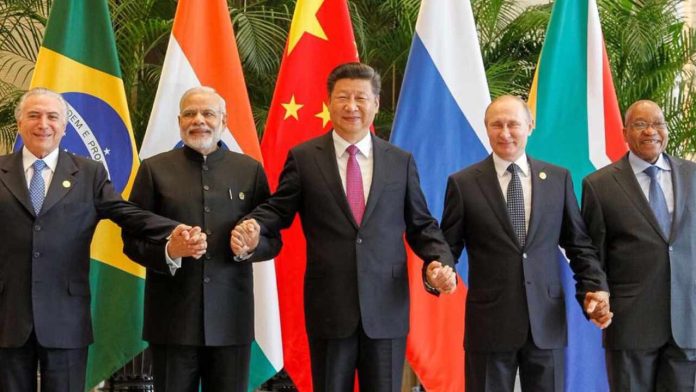The BRICS nations are reportedly laying the groundwork for a new type of currency, which is expected to be revealed at the next BRICS leaders’ summit, according to a high-ranking Russian official. “The changeover to settlements in national currencies is the first step. The next one is to promote the circulation of digital or any other form of a fundamentally new currency in the near future,” said Deputy Chairman of the Russian State Duma, as quoted.
New Currency for BRICS Countries
The BRICS countries are reportedly focusing their efforts on developing a new type of currency with a plan to present its progress at the BRICS leaders’ summit in August, State Duma Deputy Chairman Alexander Babakov announced Thursday at the India-Russia Business Forum in New Delhi. This Forum marks the beginning of international events leading up to the St. Petersburg International Economic Forum in 2023. As quoted by the top Russian official:
The first step is to turn to settlements using national currencies. The next is to make digital and any other form of fundamentally new currencies available for circulation in the near future. At the BRICS leaders’ summit, we will announce the project’s readiness. These works are in progress.
The BRICS countries are Brazil, Russia, India, China, and South Africa. Several other countries are interested in joining the economic bloc, including Argentina, Iran, Indonesia, Turkey, Saudi Arabia, and Egypt. South Africa joined the bloc in 2008 and the next BRICS summit is scheduled to take place in August.
The BRICS countries have already embraced the use of national currencies for settlements. Recently, Russian President Vladimir Putin and Chinese President Xi Jinping agreed to adopt the Chinese yuan as a settlement currency for emerging economies. The Chinese government also signed a bilateral agreement with Brazil to facilitate trades using their national currencies.
Babakov noted that it was possible that a unified currency could be created within BRICS. This could be backed possibly by gold or other commodities like rare-earth elements.
At the India-Russia Business Forum on Thursday, Babakov stated that it was important for India and Russia “to set up a new economic association with a new, shared currency,” but noted that China could play a critical role in developing a common currency for all three countries. He was quoted by India TV as saying:
New Delhi, Beijing, and Moscow are the countries that have now established a multipolar world, which is supported by the majority of governments. Its composition should be based upon creating new monetary ties that do not defend the US dollar or euro but which can benefit our mutual objectives.
The Russian official also expressed satisfaction with his country’s economic situation while criticizing US President Joe Biden and the European Union. He argued that the euro and the dollar serve the interests of Washington and London and they should be recognizing the wider global community instead of individual countries like Russia, India, and China as equal counterparts.
What do you think about the BRICS countries creating a common currency? Let us know in the comments below.
Image Credits: Shutterstock, Pixabay, Wiki Commons
Disclaimer: This article is for informational purposes only. It is not an offer to sell or a solicitation of a sale, nor a recommendation or endorsement for any products, services, or companies. Bitcoin.com is not a provider of investment, tax, legal, or accounting advice. Neither the author nor the company is responsible for any losses or damages caused or alleged to have been caused by the use or reliance of any content, goods, or services mentioned in this article.

